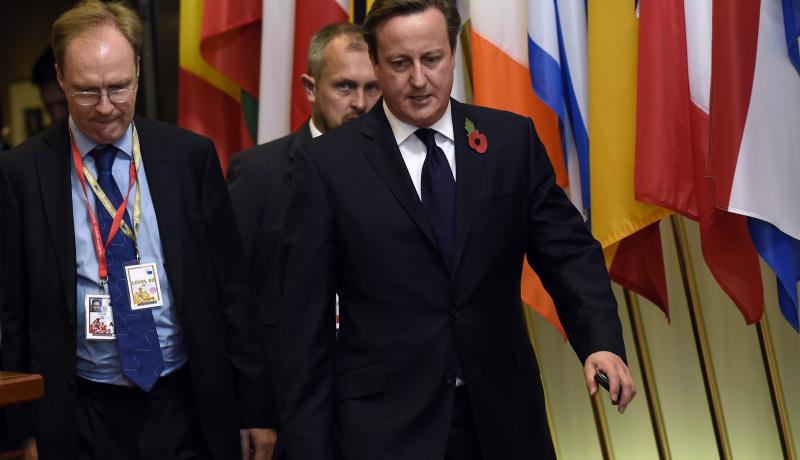
[Chatham House: David Cameron, Jean-Claude Juncker’in Avrupa Komisyonu’na başkan olmasına karşı yürüttüğü düşüncesiz kampanya, AB’nin nasıl işlediğini tam kavrayamadan yaptığı diğer tüm yanlış hareketlerle beraber kendi ayağına ateş etmiş ve İngiltere’yi Avrupa Birliğinden atılmanın eşiğine getirmiştir.]
Is the call for an additional contribution to the EU budget as outrageous as David Cameron has asserted, or simply the normal application of EU rules and mechanisms? In reality, it is a bit of both, but there is more to the story. – See more at:
When David Cameron emerged from last Friday’s European Council meeting, the indignation on show could not have been greater: ‘If people think I am paying that bill on 1 December, they have another think coming.’ He was responding to new figures revealed last week which call for an additional £1.7 billion contribution to the EU budget from the UK. In what is a routine recalculation, several other countries, including the Netherlands, have been asked to pay proportionately more than the UK, while Germany, France and 17 others will pay less.
Is this as outrageous as the prime minister has asserted, or simply the normal application of EU rules and mechanisms? In reality, it is a little bit of both, but there are three elements to the story.
The first is that most of the EU’s revenue derives from an income stream known as the GNI (gross national income) resource. GNI is a close relative of the more familiar term GDP (gross domestic product), differing largely because of how profits from abroad are counted. As such, it reflects relative prosperity and, thus, ability to pay – a widely accepted principle of taxation. The amount called from each member state is a fixed proportion of its GNI, though the true cost to the UK is then attenuated by the famous rebate negotiated in 1984 by Margaret Thatcher. Despite some of the headlines about a ‘tax on prosperity’, the principle that countries pay more when GNI rises has been accepted since the system was introduced over a quarter of a century ago. In some years the UK has benefited, in others it has had to pay, as have all other member states.
Second, the GNI resource was something that British negotiators pushed strongly for when it was first introduced, and that the UK has fought to retain ever since. Others have argued for a tax to be assigned to the EU, in much the same way as council tax in the UK or sales taxes in the United States are deemed to belong to the local tier of government. But the UK, along with other net contributors to the EU budget, notably Germany, has been adamant that there should be no such tax. The total amount called from the GNI resource is determined by the spending from the EU budget and, in this regard, acts as a residual resource to ensure that the EU budget always balances (as it is required to do by treaty). Spending is not entirely predictable because the rigorous controls which countries like the UK insist that the EU impose have meant that some projects only become eligible to receive funding much later than anticipated.
The third consideration is that this year’s calculations are unusual, because the statisticians who construct the GNI data recently completed a methodological review of how national accounts are compiled. These are once-in-a-decade exercises, intended to reflect new insights into how income is generated and advances in data collection. The results revealed that the UK, and a number of the others now being asked to pay more, have been underestimating their prosperity. Normally this would not be that significant, but one of the new factors taken into account is the scope of the hidden economy. In particular, new estimates have been made of the extent of the drug and prostitution markets, something that Germany was apparently already doing.
These data corrections are well-known to the UK authorities and the spicier bits of the new methodology made the news headlines over the summer. Nor is it a form of correction that the Treasury can plausibly claim not to have expected. Indeed, in the late 1980s, Italy revalued its GDP and GNI substantially after introducing new ways of estimating the size of its hidden economy. Overnight, Italy overtook the UK – known at the time as il sorpasso (the over-taking) – but also reportedly drawing the retort from Thatcher that the Italians could henceforth pay more towards the EU budget. Moreover, it is ingrained into Treasury officials that they should be alert to any statistical manipulation that would increase GNI, precisely because of this sort of effect. Therefore, the prime minister is either being disingenuous in claiming that the effects of the re-basing of GNI were unexpected, or he knew full well and decided, nevertheless, to exploit it for immediate political purposes.
Other countries and the European Commission insist that the rules are clear and that Britain will have to pay, implying little room for manoeuvre for the prime minister. Perhaps some fault will be discovered in the calculations, allowing a more palatable figure to emerge. There is also a possibility that enough pressure will be brought to bear on the net winners to persuade them to postpone or average out the introduction of the new GNI estimates, reducing the amount the new net losers will have to pay this year. However, tax-payers in other countries will wonder why their governments should agree to pay more to help the British prime minister mollify eurosceptics at home. Postponing the bills would also be tricky because the EU is legally banned from borrowing.
Leaving aside whether Cameron’s stance leaves wiggle-room to pay subsequently (though only after the Rochester and Strood by-election), the new dispute is revealing about his approach to the EU. It follows his ill-judged campaign to prevent Jean-Claude Juncker becoming president of the European Commission. Two conclusions can be drawn: first, that not enough effort is made to understand how the EU functions or to form alliances to head off potential trouble; and second, that there is too much of a tendency to shoot from the hip. This is a conjunction that can only add to the prospects of further imbroglios and a growing probability of a Brexit.
Professor Iain Begg
Associate Fellow, Europe Programme – Chatham House




